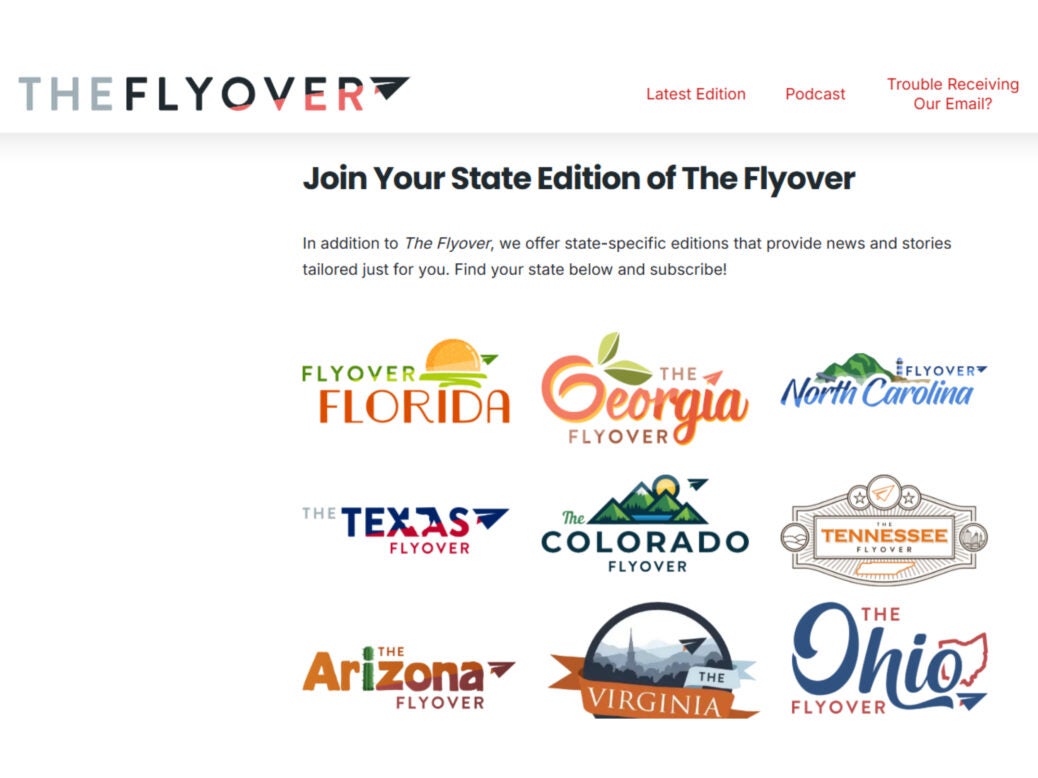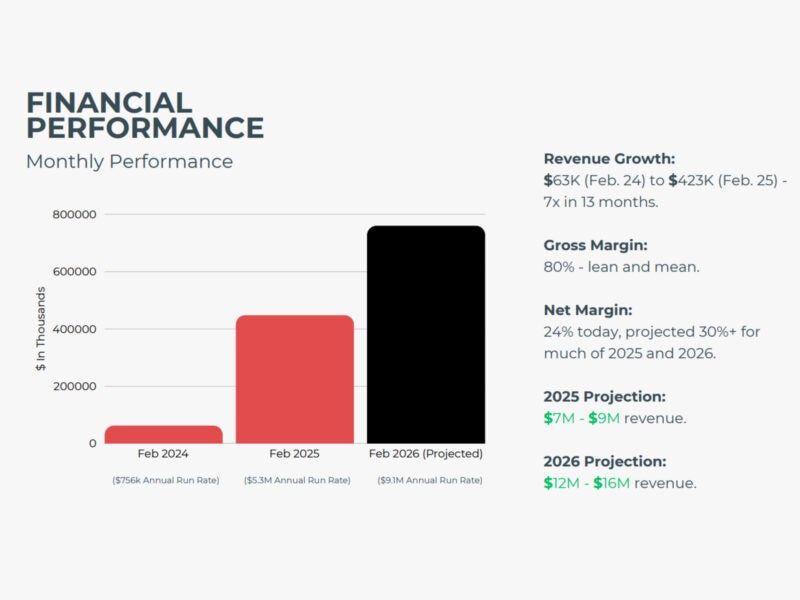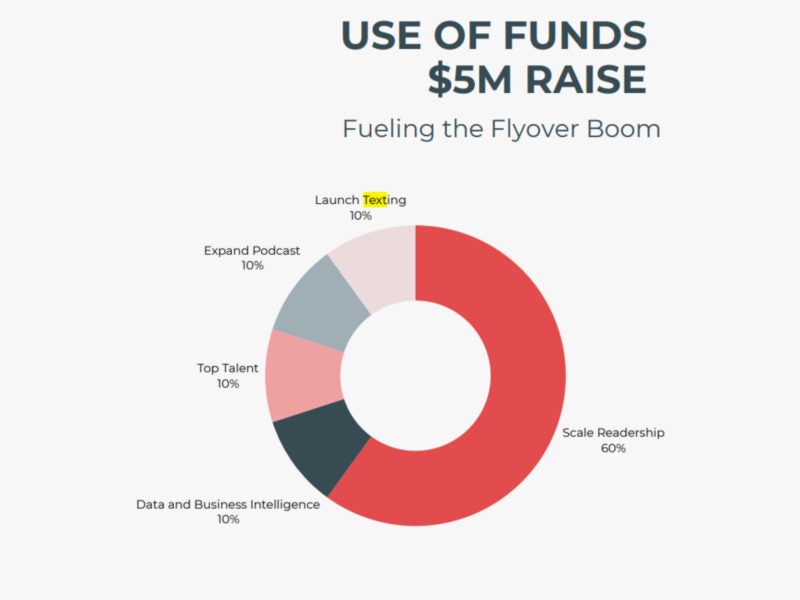
A US-based email-first news publication now has 25 full-time staff after targeting a gap in the market for state-level coverage.
The Flyover uses email distribution platform Mailgun and is built around the belief that “legacy media has failed”.
With nine state-specific editions and one national edition sent out to 2.5 million email addresses every weekday, the company pushes out 51 different editions a week, along with its extra “Feel Good Friday” email.
“On top of that, we’re doing eight podcasts a week, available on Spotify, Apple and Youtube,” said Guy Short, founder of The Flyover.
The title launched in April 2023, and has a “state-first strategy”, which sees it invest marketing spend in growing the email list for its state edition, before then converting these readers to also sign up for its national title.
This works for “monetising a reader twice, not once,” said Short.
“State-wide news – not just local papers – you don’t really have that [news] source,” said Short.
“We provide that, and as we have very little competition it’s a very low acquisition cost. We then introduce them to the national.
“It’s difficult if we approach with national first, as there is so much competition, which is what we used to do.
“We do a really good job of converting our state readers to our national readers. There’s less of a barrier to [obtain readers] as we have gained their trust.”
[Read more: Press Gazette publishes ultimate guide to reader conversion and monetisation]
The Flyover offers news divided into politics, sports, science and tech, lifestyle, and also sends themed editions, such as “Wisdom Wednesday, where we get pieces of wisdom from different sources, or a Travel section on Tuesdays”.
It has 25 full-time staff including editors, writers and commercial as well as two podcast hosts (Ayla Brown, former American Idol finalist, and Amy Hess, an Emmy-winning producer). It also employs part-time proof readers and weekend writers.
How The Flyover makes its money
The Flyover aims to double its reach to five million readers in 2026.
It gets most of its revenue from direct sold advertising (97%), and a small portion (3%) from reader contributions.
“We do anything from three to five ads per edition per day – that’s close to 30 ads we run a day, not including podcasts or feel good Friday, which adds more onto that.”
Readers are invited to voluntarily donate to The Flyover, with no set amount requested, but some have contributed “hundreds of thousand of dollars” to the title.
“Flyover Country” is a term with negative connotations to describe the US states in between the two coasts.
The publication sets out its pitch to readers saying: “We know firsthand that people in Flyover Country are good, traditional Americans—populists at heart, anti-elitists who love their country.
“We also know that everyday Americans in Flyover Country are avid news readers. They want to consume relevant content, rather than being subjected to corporate media bias.”
The publisher says it spends $0.54 on advertising and marketing to acquire each new reader email and then is able to make an average of $5.76 out of selling advertising against each new reader.
Acquisition channels include: paid social media advertising, Google ads, paid ads in other newsletters, paid search, purchasing dedicated email sends from other providers and publications and referral programmes. The Flyover has a dedicated acquisition team focussed full time on acquiring, engaging and retaining readers.
One year after launch, in April 2024, The Flyover said it reached $116,000 in monthly revenue, which increased by 331% to $500k in the month of June 2025. Annual evenue is projected to reach up to $9m overall by the end of 2025.
Short said The Flyover will “always be free” to readers.
“Some people say if you subscribe to a newsletter you’ll get an ad-free version, but if you like us and want to contribute $5, folks will throw us some contributions out of the goodness of their heart.”

Public share offer raises $1m in a month
The Flyover launched a public share offer in July 2025, and raised $1m in one month. It aims to raise $5m overall, intending $3m to be put towards scaling readership, and $500k spent on data intelligence, hiring, podcast expansion and a new SMS text-messaging platform.
The fundraiser invites readers to become investors in the business with a minimum stake of $750.
In its pitch deck, the company describes itself as “one of the fastest growing digital media companies” in the US, with “unique state-focused news” setting it “apart”.
“Email news publications are booming – readers ditch social media algorithms and bias. Trust in legacy media is tanking – demand for unbiased news is skyrocketing.”

Building engagement with audience
When Short first started The Flyover, he said he “read literally every email and responded to everything”.
“We now have a customer service team who respond, but we ask readers direct, personal questions like, ‘do you have friendships with age discrepancies?’ We get so many responses. We respond to every single one of these, we’ve built this engagement with our audience. They tell us, ‘I can’t believe you responded – no one ever responds!’ I think that’s why we get financial gifts.”
Short described the publisher-audience relationship as “very unique” – “not everyone can do it,” he said.
The Flyover also provides a survey when a user signs up, asking for more details such as income, relationship status and age. This first-party data can then be sold on to other businesses or used for data modelling “to find more readers like the ones we already have and target them on Facebook, inviting people to join”.
Short said The Flyover’s next move is delivering content via text so it doesn’t have deal with email service provider issues through its delivery.
“Deliverability is always a challenge, with Yahoo making certain updates we were scrambling to make sure we’re compliant and we’ll still be delivered to people’s inbox.
“There’s less chance we’ll struggle to deliver [via SMS] than the email side,” he said. “On text, The Flyover would send over as a link in the morning, and take you to a page with the advertisers appearing just as they would on email.
“We think we’ll be able to monetise it too, but it is more expensive. So, we must work out this business model.”
Email pged@pressgazette.co.uk to point out mistakes, provide story tips or send in a letter for publication on our "Letters Page" blog
